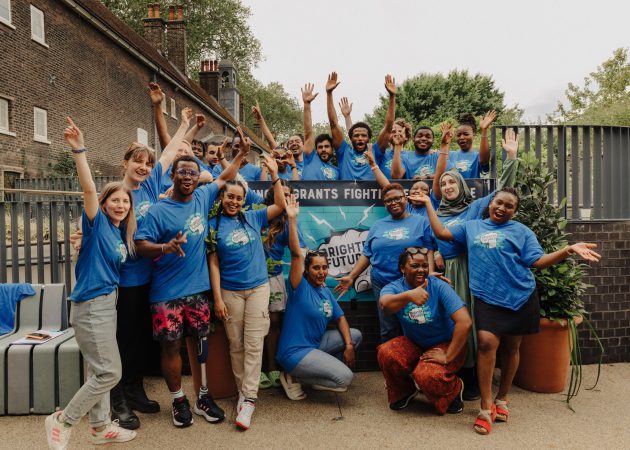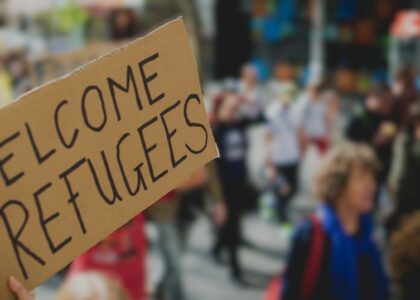🕒 7 min read
For many young people living in the UK without legal immigration status, homelessness is not just a risk, but a reality. These young people, often undocumented or forced to navigate long and costly immigration processes, face significant barriers to education, employment, housing, and public support.
Unlike refugees who have been granted legal protection, and who face their own unique challenges, undocumented young migrants remain invisible to official systems and face a hostile environment that denies them legal rights and restricts their access to resources. The result is a higher risk of destitution and homelessness. This is often made worse by lengthy waits for immigration decisions and limited access to legal advice. Ultimately, young people caught up in the immigration process face an uncertain future.
Many have grown up in the UK, attended school here, and assumed they were British, until they turn 18 and are shocked to discover they can’t access higher education, jobs, housing, and in some cases, healthcare. In London alone, approximately 107,000 children and 26,000 young people aged 18-24 were undocumented in 2020, with more than half of them born in the UK.
Anna Mulcahy is an Immigration Advisor at Praxis, part of the London Youth Gateway project. We spoke to her about the hidden struggles faced by undocumented young migrants aged 18–25.
“They’ve grown up here. They thought they were British. And then they turn 18 and find out they can’t go to university and don’t have the right documents.” – Anna, Praxis
Undocumented young migrants are forced to navigate a hostile and complex system made up of changing laws, lengthy application processes and limited access to legal services. This leaves many people without a clear path to resolve their legal status, a process known as “regularisation”, and therefore lack stability and safety.
While official statistics show a sharp rise in homelessness among refugee households, the true scale of homelessness for undocumented young people remains largely unknown.
Early risks are clear: research has shown that nearly half of all children in the UK with migrant parents (around 1.5 million) live in poverty. Not all of these children are undocumented, but those who are face even greater barriers, putting many at greater risk of homelessness as they reach adulthood and lose the protections which are given to children.
In this blog, we explore how immigration status and homelessness intersect for young people in the UK, how peer-led initiatives like Brighter Futures are stepping up where formal services fall short, and why change is urgently needed.
Before we get started
If you’d like to learn more about how we support people at risk of or experiencing homelessness, join our newsletter for the latest updates—and consider making a donation to help us continue this vital work.
Who Are the Young Migrants Praxis Supports?
Praxis is a human rights charity based in London, supporting around 2,500 migrants and refugees with expert immigration and welfare advice each year. They also facilitate the Pan-London Migrant Frontline Network, which brings together frontline staff who work with people experiencing homelessness in London related to their immigration status. Anna Mulcahy and the rest of the Praxis immigration team work with young people aged 18-25 who need immigration advice or are experiencing issues with immigration or within the immigration system.
Anna explained that they have a lot of asylum seekers accessing their service, as well as people who were born in the UK or who came here when they were children, or who are undocumented.
“People understand refugees, but they don’t really have a good understanding of being undocumented or that a child can be born in the UK and they can grow up undocumented.” – Anna
I Thought I Was British, Until I Wasn’t
Anna explained that many of the young people she supports experience shock when they first try to find work, rent or move on to higher education, as they discover that they are undocumented, and not recognised as British citizens.
The UK’s so-called “hostile environment” approach to immigration makes it extremely difficult for undocumented migrants to gain legal status or access public services. This can be very stressful for the young people involved.
Securing legal immigration status in the UK is rarely straightforward. Those affected often have to navigate confusing legal systems, provide extensive documentation, and wait months or even years for a decision. Many go through this process without access to quality legal advice, during which time they may be facing homelessness or financial insecurity, due to barriers in accessing housing, benefits or education.
“They’ve grown up British, for anyone they’re as British as their peers at school — but they still don’t have any rights because of the hostile environment.” – Anna
Despite feeling and living as British in every sense, many of these young people face a painful disconnect between their identity and the legal reality. This gap can make it hard for them to fully understand the urgency of their situation, especially when they have other concerns like starting university or securing employment.
“Sometimes we have to persuade people to actually worry about their immigration status, because in their mind they’re British and they’re not going anywhere. They just want to go to university, and they can’t.” – Anna
The Role of Praxis and the London Youth Gateway
For young migrants, legal advice can be difficult to find. Praxis helps bridge this gap through its immigration advice and casework services, which focuses on supporting young people aged 18-25 who are experiencing homelessness or legal uncertainty. The charity has a dedicated immigration team of 25 legal specialists working to support clients with a range of complex cases.
Many referrals to Praxis come via New Horizon Youth Centre, one of the key partners in the London Youth Gateway project. Young people can visit the centre in Camden, where they are assessed and referred to the appropriate support service, including immigration casework from Praxis. Alongside other partners such as Stonewall Housing, Depaul and Gallop, the project provides a holistic support network that combines legal advice, housing help, mental health services and peer support across London.
For those referred to Praxis for support, the processes can be very complex. Even when someone is eligible to apply for permanent residency, preparing their application and waiting for a decision from the Home Office can often take six to twelve months. Whilst they wait for a decision to be made, many young people are left without secure housing or financial stability.
Community as a Superpower: Brighter Futures

Brighter Futures is a community project supported by Praxis, offering peer support to young migrants who are facing immigration issues. They meet once a week at the Praxis offices, where they can openly discuss the immigration challenges they face, such as legal uncertainty, social isolation, and barriers to education or work.
The project combines peer support with campaigning and education, empowering young people to have their voices heard. But it’s not just practical advice and advocacy, as members also get together to plan campaigns and events, play games, and simply enjoy good food together, building a community around shared experiences.
Brighter Futures is an important space for young migrants to find support and feel empowered, especially due to a lack of formal systems available to them.
Misconceptions and Missed Chances
For many young people who are undocumented, a lack of early legal intervention has led to long-term instability and trauma. Some fall through the cracks because they weren’t able to navigate the system earlier. They may have been eligible to apply for British citizenship as children, but may not have been aware of the options available to them or how they could access support.
Research from the Children’s Society shows that many families with No Recourse to Public Funds (NRPF) are often unaware of their rights or the complex legal steps needed to secure their child’s immigration status, leaving young people vulnerable to losing their legal status and at increased risk of homelessness later on.
Additionally, local authorities often fail to act in time, and once these young people reach 18, they’ve already lost crucial time and the limited protections afforded to them as children.
“A lot of young people that we see who are now like 22, 23, homeless, really traumatised and in a really bad situation — if they’d had a decent lawyer when they were like 12 or 13, I think things could have got sorted out. It’s a real scandal.” – Anna
Many people who are undocumented came to the UK as children. Currently, there are 215,000 undocumented children in the UK, and half of them were born here. For families, it’s often the case where different family members have different legal status, meaning there is a constant fear that a loved one could be detained or deported.
What Needs to Change
There is no shortage of expertise or evidence about what works, the real issue is political will. As Bethan Lant, Project Lead at Praxis explained at our recent Frontline Network Annual Conference:
“Young people are being systematically ignored by policymakers and commissioners: so we campaign for change.”
This is especially true for undocumented young people facing homelessness, whose voices are often left out from policy debates that directly impact them. Many have lived in the UK for most or all their lives, yet are still denied the rights and stability that others take for granted.
The UK’s immigration system offers few clear or affordable routes for people to regularise their legal status. Long, expensive legal pathways are a common experience for those affected. During this period, young people may be prevented from working, unable to access public funds, and because of this, risk experiencing homelessness. Other European countries, such as France, Portugal and Spain, offer much more accessible and humane systems for people who have built their lives in these countries.
To prevent undocumented young people from facing homelessness and uncertainty, through no fault of their own, the UK Government must act. We need:
- A simplified and affordable regularisation process, such as a five-year pathway for people who have been long-term residents in the UK
- Immigration application fees to be reduced, so they are more affordable
- Reinstatement of birthright citizenship so that children born in the UK are automatically recognised as British
- More funding for legal advice and early intervention to help young people before they face a crisis
- Proper coordination between immigration support, housing and social care services
No young person in the UK should be left behind. They deserve a safe place to call home, fair opportunities and a future they can plan for.
You can find out more about Praxis and Brighter Futures by visiting the links below.
Make a real difference.



